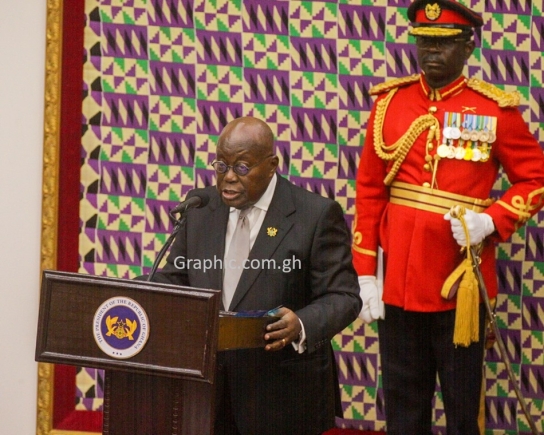
Banking sector cleanup was act of necessity, not of vendetta - Akufo-Addo
President Nana Addo Dankwa Akufo-Addo has told Parliament that the banking sector cleanup his administration undertook was an act of necessity and not of vendetta.
He said it was a bold and decisive intervention to safeguard the strength and integrity of Ghana’s financial system.
“The illegalities and irregularities perpetuated by the affected banks and financial institutions are well documented and indisputable,” he said.
Delivering his last message on the state of the nation address in Parliament today, he said those illegal practices threatened the very foundation of Ghana’s banking sector and jeopardised the hard-earned savings of millions of Ghanaians.
“Our actions ensured that not a single depositor lost their money—an unprecedented achievement in financial crisis management,” he said.
Restoring public confidence
The President told legislators that today, the results following the banking sector cleanup were there for all to see.
He said the sector had become more robust, with 12 stable and resilient banking sector capable of driving economic growth and supporting the aspirations of the people.
He described the move as a necessary decision to restore public confidence and secure the future of Ghana’s financial sector.
“Mr Speaker, my government recognised, at the very outset, that the fight against corruption required more than rhetoric; it demanded systemic, sustained and strategic action.
“To this end, my government initiated a holistic programme of legislative, administrative, financial and technological reforms,” he said.
Fighting corruption
He pointed out that one of his most satisfactory moments as President was when his administration established the Office of the Special Prosecutor.
For him, such initiative was not just another government office but it was—and still is—a symbol of his administration’s determination to tackle corruption head-on.
“I wanted Ghanaians to know that no one, no matter their rank or status, would be above the law,” he said.
With its creation initially met with considerable skepticism in some quarters, he said he believed that, now, there was general consensus that it had been an important contributor to anti-corruption efforts.
“During my first term, we passed the Witness Protection Act in 2018, creating a framework to safeguard individuals who cooperate with law enforcement, especially in corruption cases,” he said.
Furthermore, he said the Criminal Offences (Amendment) Act of 2020 elevated corruption from a misdemeanour to a felony, with harsher penalties of 12 to 25 years of imprisonment.
“We also enacted key laws such as the Fiscal Responsibility Act, the Revenue Administration (Amendment) Act, and the Anti-Money Laundering Act, all of which have strengthened our institutional framework to combat corruption and ensure accountability.
“We ensured that all allegations of corruption levelled against appointees were duly investigated by independent institutions of state, which generally dismissed them as unfounded,” he said.
Unprecedented budgetary support
in a bid to strengthen accountability institutions, President Akufo-Addo touted how budgetary support for such institutions witnessed unprecedented increases.
For instance, from 2017 to 2023, he said CHRAJ’s budget increased by 99 per cent, Parliament’s by 100 per cent, the Office of the Attorney-General by 162 per cent, the Audit Service by 258 per cent, and the Police by 274 per cent.
“These investments reflect my administration’s commitment to empowering these institutions to discharge their mandates effectively, which means that the tools needed to exact accountability from all public office holders, including those of my own government, have been considerably sharpened,” he said.
